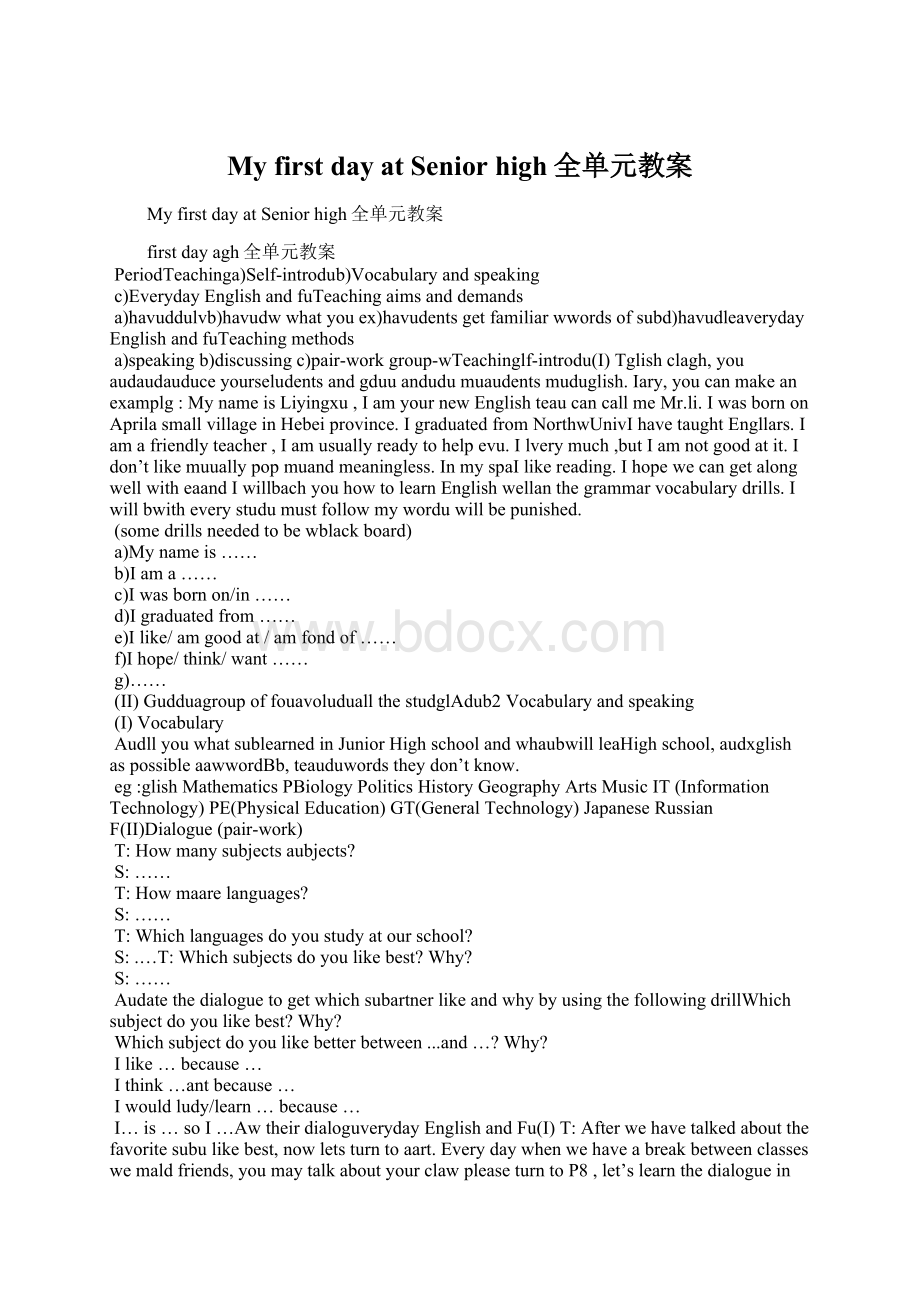My first day at Senior high全单元教案.docx
《My first day at Senior high全单元教案.docx》由会员分享,可在线阅读,更多相关《My first day at Senior high全单元教案.docx(8页珍藏版)》请在冰豆网上搜索。

MyfirstdayatSeniorhigh全单元教案
MyfirstdayatSeniorhigh全单元教案
firstdayagh全单元教案
PeriodTeachinga)Self-introdub)Vocabularyandspeaking
c)EverydayEnglishandfuTeachingaimsanddemands
a)havuddulvb)havudwwhatyouex)havudentsgetfamiliarwwordsofsubd)havudleaverydayEnglishandfuTeachingmethods
a)speakingb)discussingc)pair-workgroup-wTeachinglf-introdu(I)Tglishclagh,youaudaudauduceyourseludentsandgduuandudumuaudentsmuduglish.Iary,youcanmakeanexamplg:
MynameisLiyingxu,IamyournewEnglishteaucancallmeMr.li.IwasbornonAprilasmallvillageinHebeiprovince.IgraduatedfromNorthwUnivIhavetaughtEngllars.Iamafriendlyteacher,Iamusuallyreadytohelpevu.Ilverymuch,butIamnotgoodatit.Idon’tlikemuuallypopmuandmeaningless.InmyspaIlikereading.IhopewecangetalongwellwitheaandIwillbachyouhowtolearnEnglishwellanthegrammarvocabularydrills.Iwillbwitheverystudumustfollowmyworduwillbepunished.
(somedrillsneededtobewblackboard)
a)Mynameis……
b)Iama……
c)Iwasbornon/in……
d)Igraduatedfrom……
e)Ilike/amgoodat/amfondof……
f)Ihope/think/want……
g)……
(II)GudduagroupoffouavoluduallthestudglAdub2Vocabularyandspeaking
(I)Vocabulary
AudllyouwhatsublearnedinJuniorHighschoolandwhaubwillleaHighschool,audxglishaspossibleaawwordBb,teauduwordstheydon’tknow.
eg:
glishMathematicsPBiologyPoliticsHistoryGeographyArtsMusicIT(InformationTechnology)PE(PhysicalEducation)GT(GeneralTechnology)JapaneseRussianF(II)Dialogue(pair-work)
T:
Howmanysubjectsaubjects?
S:
……
T:
Howmaarelanguages?
S:
……
T:
Whichlanguagesdoyoustudyatourschool?
S:
.…T:
Whichsubjectsdoyoulikebest?
Why?
S:
……
AudatethedialoguetogetwhichsubartnerlikeandwhybyusingthefollowingdrillWhichsubjectdoyoulikebest?
Why?
Whichsubjectdoyoulikebetterbetween...and…?
Why?
Ilike…because…
Ithink…antbecause…
Iwouldludy/learn…because…
I…is…soI…AwtheirdialoguverydayEnglishandFu(I)T:
Afterwehavetalkedaboutthefavoritesubulikebest,nowletsturntoaart.Everydaywhenwehaveabreakbetweenclasseswemaldfriends,youmaytalkaboutyourclawpleaseturntoP8,let’slearnthedialogueinEverydayEnglishandFuAudlaadthedialogueinpairs.(expladifficultwordsandteachaubylookingudictionary)
AudadandanalHowareyoudoing?
2Ohreally?
3Isthatright?
(II)Wairs.Makeaconversationabouurclasses.Uversaactivlp.AandadialogueouummaTheteachersummarythewholeclaudentsandtellthemwhaulddvHomewIReviewthedrillswelearnedlaIIPreviewReadingandvocabularyCulturalPeriod2
Teachinga)Readingandvocabulab)CulturalTeachingaimsanddemands
a)gudunderstandthetextswell
b)gudwllls(athomeandUSA)
c)heludvadingabilTeachingmethods
a)speakingb)readingc)discussingd)pair-workgroup-wTeachingRevIReviselastclassbyawhichsublikebestandwIIReviseeverydayEnglishbyaskingwhichclassdoyouhavebeforeourEnglishclassandtalkaboutitwlpofEverydayEnglishandFuP2Lead-in(Discussandcompare)
T:
Everybody,wehavestudiedinanewschoolnamedPingluoMiddleSchool.Buallofyoustudiedindls,nowIwillgiveyouwhatthemaindandsimilaritiesbetweenJuniorHighschoolandHighschool.
Andadiscuwoproblems:
1DoyouatworkaHighschoolisharderthanthatatJuniorHighschool?
2AHightealartoJuniorHighteachers?
T:
AfterwehavecomparedHighschoolandJuniorHighschool,nowwewillleagaboutLikang’sFirstdayaHigh.beforewereadthetextlet’sleawordVocabulaDealwvocabularyonP2bgthequaReading
IScanning
Readthetextquicklyanddtheanswquestions:
a)WhatarethedbetweenLikang’sJuniorHighschoolandHighschool?
b)Whatawothingglishteaanttodoinclass?
c)Whatawothingsthaglishteacherwave?
IIUnderstanding
Playthetaudentsandalistenreadfollowingthetapeinalowvoice.TartinReadingandVocabularyonP3.
IIICareful-reading
AudadthepassageagainandfindoutwhichwordboxartofReadingandVocabularyonP4.AndaguaningandexplainthewordsinEnglishaccordingxt.
AudadummaLikang’abouwschoolxthpartinReadingandVocabularyonP4.DecidewbIVDiscuT:
WehaveknowntheLikang’slifeaHigurEnglishclassroomlikeLikang’s?
isyourclaaashis?
Isthenumberofboysandgirlsthesame?
AreyoulookingforwardtodoingyourEnglwork?
NowpleasediscusswithyourpartnerandcompareyourschoollifewithLikang’ulturalT:
wehavelearnedlikang’sschoollifeagh,doyouwawthelaglarageofyouuntries?
NowpleaseturntoP9,let’sreadthetextinculturalandleagabouHighschoollUS.
IAudlapeandreadthetext.
IIAudanswllowingquestions:
a)WhatarethedbetwgradaandtheUS?
b)Howlyeardivided?
c)HowlongdummerVacationlast?
d)Whendartandl?
e)Whatdotheydoal?
IIIAudarealdulvacaudytimeafter-schoolactivabyimitatingthelulturalummaTheteachersummalassbycomparingllaandtheUS.
Homework:
IWriteareplytoRobMarshall
IIReadthetextforasmaaan
IIIPreviewthelanguagwopassages.
Period3
Teachinga)thelanguagwopassages
b)antanddifficultdrillwopassages
Teachingaimsanddemands
a)gudausefulwordsorexb)gudaantdrills
c)guddxaboutthelanguagd)vudentsabilityofusingEnglTeachingmethods
a)Explaining
b)Discovering
c)Practicing
TeachingRevReviselastclassbghomeworkandanaludents’replies.Youcanalsoaudadthegoodreplud2LanguageStudy
IUnderlusefulexubjectacademicsubbesimilarto…dbetweenAandBtheattitudeto…teachingmethodaarfrom…writedown…uawebsitesawomancalled….bglakalotinclasshavefunintrodulgroupsgivesbinstructionsworkbyoneselveone’sspellinginafunwaword’shomeworkadlookforwardtodoing…
bdwith…AaasBthenumbAmericanschooldal
cover7yeavghschooldiplomagotocollege
divide…berthroughDecembertakepabdo…withoulpofsbbds
lastalongtimeTapopularbeliefTheysaythat
havesimilarlifeexundaThadoing…
asksbabout…doexavedayonatschooltakeabuldaybefluawithfluencymakealgatthebeginningofwballovertheworldllofpawallmoveto…
havethebiggestsmile
IIAnallanguagA)Wordationnounfactsordetailstellingsthaboutasituavationabout/onsb/sth关于某人/谋事的信息
aation一则消息;一份情报
aationon/about打听关于……的消息2instru(pl)sththatsbtellsyoutodo指示
(pl)informawtodoorusesth说明
followu遵守……的指示u(howtodo)sth(如何做)某事的指示udosth做某事的指示b’instructions遵照某人的指示
beundudosth被指示做某事u有关……的指示barrassedadj.feelingnervousanduableandworrying
beembarrassedtodosth羞于做某事
beembarrassedabout/at对……感到困窘
4attitudensb’lingsabouallyasshownbbehaviour
attitudeto/towardssth/sb对某人/某事的态度
5behaviournwaating;mabehaviourtowards/to……对……的态度/行为
b’sgood/bestbehaviour循规蹈矩;行为检点
putsbbestbehaviour规劝/警告某人要规规矩矩viousadjhappeningorexistingbvbjectyouaretalkingabout以前的;从前的viousday前一天viousto在……以前viouslyadv以前;从前vt.tohaveafavourablb;tomakesbfeeladmirationand//oponsbbwbdat/by/wakeabvervludeordealw包含
becoveredby/with被……所覆盖
covb顶替某人
cover(adistance)走(一段距离)
cover(sthnew)报道(消息;新闻)
coversthup/over盖住某物Practicing
Auddxaboutthelanguagustlearned
HomewIRemembertheusagwordstoday
IIPreviewandanaldifficulassages
Period4
Teachinga)thelanguagwopassages
b)antanddifficultdrillwopassages
Teachingaimsanddemands
a)gudausefulwordsorexb)gudaantdrills
c)guddxaboutthelanguagd)vudentsabilityofusingEnglTeachingmethods
a)Explaining
b)Discovering
c)Practicing
TeachingRevRevwordslearnedyesterdaybydoinganslationex()2languagestud.Theteaavusiasticwomancalled 这个非常热情的女老师是沈老师。
called是过去分词短语作定语,与所修饰的词之间存在着逻辑上的被动关系,相当于定语从句who/thatwascalled。
如:
Wevisitedthenewlibrarybuilweeksago.
我们参观了三周前建成的图书馆。
TxtbookswachingEnglishasaforeignlanguagecameouu 最早为外语教学而写的英语课本出现在十八世纪。
avitedartywuthAfrica.
被邀请来参加聚会的大多是南非艺术家。
注:
短语一般放在被修饰词之后,单个过去分词放在被修饰词之前
2.Andwehavefun.Idon'Iwillbebored'sclass!
我们上课上得很开心,我认为我不会对沈老师的课厌烦的。
(1)have(great)fun玩得开心
=have(alotof)fun
=haveawonderful lf如:
Thechildrenwerehavingalotoffunwbuildingbl 孩子们玩搭积木玩得很开心。
You'resuretohavuntonig 今晚你一定会玩得很开心。
Theyhadalotoffunchatting 他们在网上聊天聊得很开心。
fun/,是不可数名词,常用于befun结构中,相当于g。
如
Seeinggreatfun.
在公园看猴子非常有趣。
Whatfulayagameafterwork!
工作之余活动一下多么有趣!
注:
此处的whatfun不能用howfunny代替,因为"funny"是“滑稽的,好笑的”的意思。
[拓展]forfun=infun开玩笑地
makefunof嘲笑,取笑。
如
I'mnotsayingsuchaseriousthingforfun.
我说如此严肃的事情绝不是开玩笑。
It'sbadmaakefublind.
取笑盲人是不礼貌的。
(2)我们要注意本句英汉表达的区别。
英语中有些动词,如think,believe,expect,sul,guess,imagine等,当它们后面接一个具有否定意义的宾语从句时,通常要把主句的动词变为否定式,而宾语从句中的谓语动词用肯定形式。
这种现象称为否定的转移。
如:
Wedon'anythingginyourpictu 我们认为你的画并没有什么有趣的地方。
Idon'tbelievewhathesaidistrue.我认为他说的不是真话。
Idon'tsuwillobugg 我想他们不会反对我的建议。
Hedidn'timaginethatshewouldgoabroad.
他料想她不会出国了。
Idon'tfeeldcanlastusthroughthew 我认为这食物是不够我们过冬的。
注:
在反意疑问句中,若陈述部分是第一人称,think等词用一般现在进,则疑部部分需与从句中的主语和谓语保持一致,否则要与主句的主语和谓语保持一致。
如:
Idon''sgoingtoraw,isit?
我认为明不会下雨,对吗?
Youdon'Ihavemademistakes,doyou?
你并不认为我犯了什么错误,是吗?
3Iwordaasmanygirlsasb 换句话说,女孩是男孩的三倍。
(1)words意为“换句话”,在句中用作插入成分。
如:
Iwordustgiveupsinging.
换言之,她必需放弃唱歌。
I'mnotusedwayyouspeaIwords,Idon'twaueourconversa 我不习惯于你对我谈话的方式。
换句话讲,我不想继续我们的谈话了。
Beethovenwrotemanyworld-famousmusicalIwords,hewasagreatmusician.
贝多芬写过许多世界著名乐曲。
换句话讲,他是一位伟大的音乐家。
①A+be+倍数+as+adj.+as+B
Asiaisfouaslarg